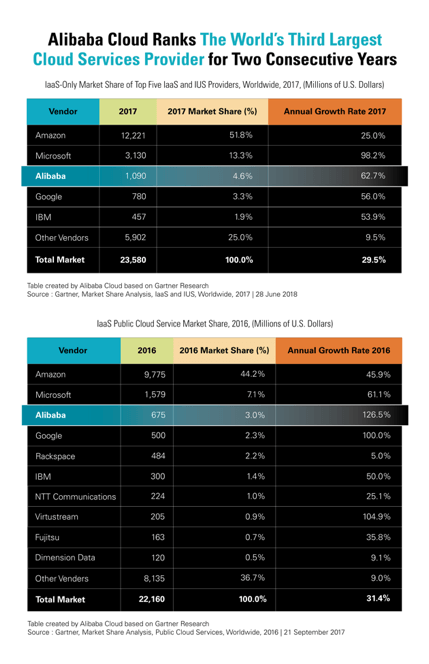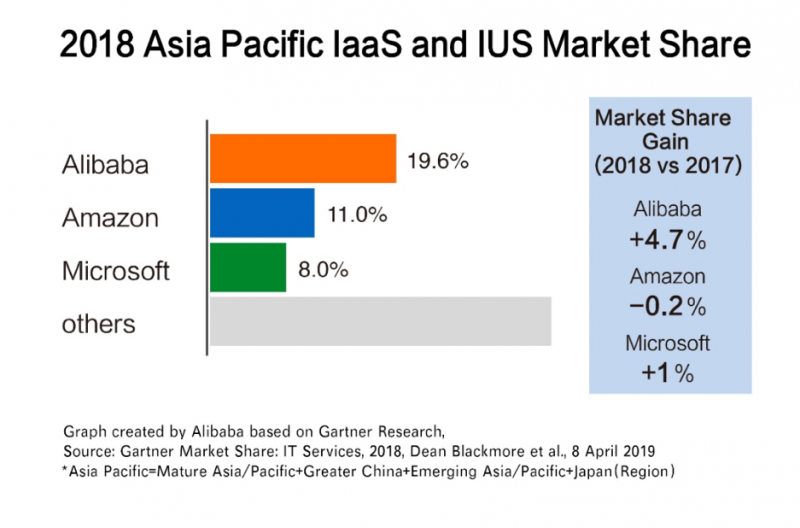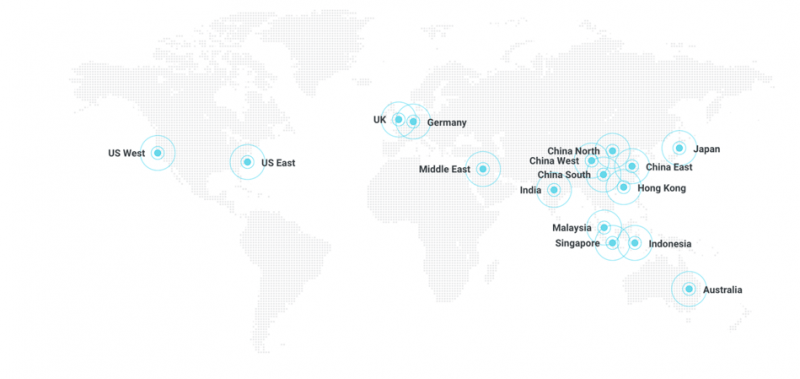Mention cloud computing, in the context of IaaS (Infrastructure as a Service), Platform as a Service (PaaS), SaaS (Software as a service) and typically several names pop into mind: Amazon Web Services (AWS), Microsoft Azure, and Google Cloud. But there is a fourth player, one that is rapidly moving up the ranks—Alibaba Cloud. In fact, Alibaba Cloud is now the world’s third biggest IaaS providers, reporting consistent triple digit revenue growth in recent years, with revenues hitting USD2.5 billion in 2018 (Data: Gartner).

According to research analyst firm Gartner, global public cloud IaaS market overall grew 31.3 percent to USD32.4 billion in 2018, an increase from USD24.7 billion. The top five providers: AWS, Azure, Alibaba Cloud, Google Cloud and IBM Cloud accounted for around 77 percent of the market, posting an aggregate growth of 39 percent.
Size and scalability matter when come to public cloud IaaS, and providers who invest capital expenditure to build data centres across multiple regions will succeed and continue to capture market share.

Global expansion
To that end, Alibaba Cloud continues to plough spend in research & development as well as expand its footprint outside of China. It now has 56 availability zones across 19 economic centres globally, with coverage extending across mainland China, Hong Kong, Singapore, Malaysia, Indonesia, India, Japan, Australia, the Middle East, Europe, Indonesia, UK and the US (East and West Coast).
Established in 2009, Alibaba Cloud is the largest public cloud service provider in China and ranked first in Asia Pacific for the second consecutive year by Gartner in its April 2019 report.

The data intelligence backbone of the Alibaba Group, Alibaba Cloud has a stranglehold in the Asia Pacific with 15 availability zones covering Singapore (3), Hong Kong (2), Australia (2), Malaysia (2), Indonesia (2), India, and Japan (2) markets. The company has the distinction of being the only global cloud provider with local data centres in Indonesia and Malaysia, demonstrating its seriousness to empower businesses in the region.
This is backed by an aggressive dedicated partner programme across ASEAN that connects service providers, system integrators, independent software vendors (ISVs) and startups.
Proven performance
What bigger testimony for Alibaba Cloud than being the force behind Alibaba’s own ecosystem—from e-commerce to logistics, payments to entertainment and travel. Alibaba Cloud is the cloud provider for the world’s largest retail event—the 11.11 Global Shopping Festival. The numbers are mind-boggling: 350 million conversations, 1 billion transactions and 45.3 billion product recommendations within the 24-hour window of the festival in November 2018.
That aside, Alibaba Cloud also powers Alipay, the world’s largest e-payment platform. It supports 870 million active users in 870 cities, with artificial intelligence (AI) used for insurance and credit assessment.
Alibaba Cloud also enables the world’s largest logistics platform—Cainiao. The cloud provider processes 1 billion parcels a day and enables next-day delivery for more than 1,500 cities. It has sped up cross-border shipment time by 60 percent.
In the Asia Pacific region, Alibaba Cloud continues to help businesses and future makers succeed beyond their home markets. It has empowered Lazada’s epic 11.11 and 12.12 shopping festivals in the region, supporting over 1.3 billion webpage visits at the peak of the festivals.
#MyFutureMaker
Closer to home, Alibaba Cloud is empowering Malaysia in its journey into becoming an innovative and digital nation. Through its initiative #MyFutureMaker, Alibaba Cloud is helping Malaysian businesses transform using actionable data intelligence, to improve local availability, provide seamless service and compliant products and solutions.
So, how is Alibaba Cloud doing this?
The strength of Alibaba Cloud is in data intelligence, providing businesses with actionable insights and decision-making capabilities powered by AI technology. These data-driven insights can support smart city traffic management, tourism development, aviation, e-payment and more future-shaping initiatives from different industries.
There’s no better presence than local presence to serve home-grown ventures. Alibaba Cloud can provide unmatched latency and response time through its two availability zones, the only global cloud provider to have infrastructure and local market knowledge in Malaysia.
Additionally, Alibaba Group recently built its first overseas Electronic World Trade Platform (eWTP) hub in Malaysia, the first such hub outside of China. The hub helps facilitate growth for local initiatives encompassing e-commerce, logistics, cloud computing, mobile payment and talent training. The eWTP is seen to be the modern-day Silk Road trade route.
Having a local presence also means Alibaba Cloud is in position to meet local regulations and standards that are trusted by top brands in Malaysia.
Already, Alibaba Cloud is powering some renowned businesses and enterprises in Malaysia including SENA, a mobility solutions provider; TNG Digital, Malaysia’s proponent of a cashless future; Genting, the entertainment moghul; AirAsia, the award-winning, world’s best low cost airline; Team Red, Malaysia’s first fully digital airline control system; and Microlink, a digital systems integrator for financial services, retail and manufacturing industries.
Watch this video:
Cloud or bust
One thing is for certain: there is no ignoring the adoption of cloud services. GlobalData forecasts that an “insatiable trend” of product launches by cloud providers will drive regional cloud services market, anticipated to be worth in excess of USD55 billion in 2022.
The growth rides on the back of increased adoption of artificial intelligence (AI), big data analytics, blockchain and the Internet of Things (IoT).
This bodes well for all public cloud players including Alibaba Cloud especially in growth markets like Malaysia and the Asia Pacific region.
Learn more about #MyFutureMaker here
This post is brought to you exclusively by Alibaba Cloud









